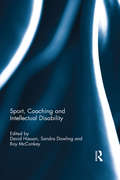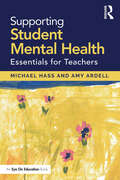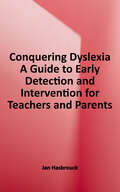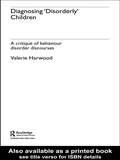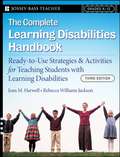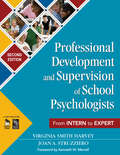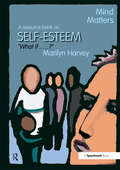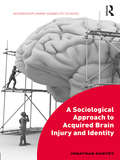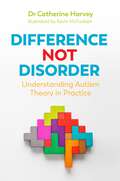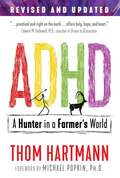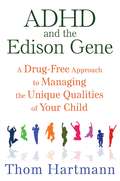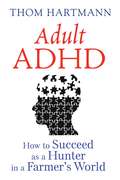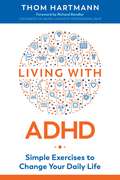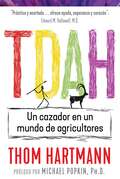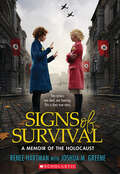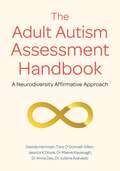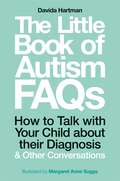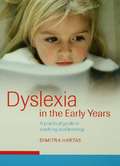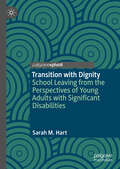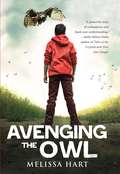- Table View
- List View
Sport, Coaching and Intellectual Disability
by David Hassan Sandra Dowling Roy McConkeyThere are more opportunities than ever before for young people with disabilities to participate in sport and adapted physical education. For example, there are more than 3.7 million athletes worldwide aligned to the Special Olympics organisation, with national associations active in more than 200 countries worldwide. Despite this rapid growth, all too often coaches and teachers lack adequate knowledge of the particular challenges faced by people with intellectual disabilities. The principal aim of this book is to improve the understanding and professional skills of coaches, teachers, practitioners and researchers, to promote awareness of successful programmes addressing the needs of such young people, and to challenge the prevailing myths and stereotypes surrounding their abilities. With contributions from leading researchers and practitioners around the world, this book is the first to explore in depth the topic of sport and intellectual disability from a coaching perspective. Including both theoretical discussion and empirical case-studies, the book covers a full range of contemporary issues and themes, including training and coaching, family support, perceptions of disability, athlete motivation, positive sport experiences, motor development programmes, and social and cultural aspects of disability. Sport Coaching and Intellectual Disability is important reading for any student, researcher, coach, teacher, manager or policy maker with an interest in disability sport, physical education, coaching, or mainstream disability studies.
Supporting Student Mental Health: Essentials for Teachers
by Michael Hass Amy ArdellSupporting Student Mental Health is a guide to the basics of identifying and supporting students with mental health challenges. It’s no secret that your responsibilities as a teacher go beyond academic achievement. You cover key socioemotional competencies in your classrooms, too. This book is full of accessible and appropriate strategies for responding to students’ mental health needs, such as relationship-building, behavioral observation, questioning techniques, community resources, and more. The authors’ public health, prevention science, and restorative practice perspectives will leave you ready to run a classroom that meets the needs of the whole child while ensuring your own well-being on the job.
Disability and the Muslim Perspective: An Introduction for Rehabilitation and Health Care Providers
by Rooshey Hasnain Laura Cohon Shaikh Hasan ShanawaniThis publication will fill a void in the literature on disability intended for use by rehabilitation and health care professionals. We highlight both the difficulties and successes that Muslims with disabilities experience as they seek access to the opportunity to live a meaningful life. The growing number and diversity of Muslims in the United States challenges disability and health care providers and researchers to understand this population's perspectives, experiences and ways of practicing Islam, particularly relative to health care, disability and rehabilitation.
To Guide and Guard
by Alexandra HasluckRelates the early history of the guide dog movement in Australia, the beginning ideas, the challenges, pitfalls, and successes.
Conquering Dyslexia: A Guide to Early Detection and Intervention for Teachers and Parents
by Jan HasbrouckDyslexia is no longer a mystery. MRI scans and other tools of neuroscience have advanced our understandings in the last decade. We now know what to do to help students become skilled, confident learners. In Conquering Dyslexia, Dr. Hasbrouck shares the instructional approaches that work best for children who have this disorder, and the most current information for parents so they can advocate for their children and communicate with educators effectively. This book addresses: - What is dyslexia? - How to identify it - Early diagnosis and intervention - Teaching students - Supporting English Learners PRAISE FOR CONQUERING DYSLEXIA A thoroughly practical book that translates the science of reading and what we know about dyslexia into practice. A must-read for teachers, practitioners, administrators, and others on the frontline of teaching all children to read. Jack M. Fletcher, Ph.D., ABPP (ABCN) Hugh Roy and Lillie Cranz Cullen Distinguished Professor University of Houston
Diagnosing 'Disorderly' Children: A critique of behaviour disorder discourses
by Valerie HarwoodBased on the author's in-depth research with children diagnosed with behavioural difficulties, this book provides a thorough critique of today's practices, examining: the traditional analyses of behavioural disorders and the making of disorderly children the influence of the 'expert knowledge' on behavioural disorders and its influence on schools, communities and new generations of teachers the effect of discourses of mental disorder on children and young people the increasing medicalisation of young children with drugs such as Ritalin. This book offers an innovative and accessible analysis of a critical issue facing schools and society today, using Foucaultian notions to pose critical questions of the practices that make children disorderly. Rich in case studies and interviews with children and young people, it will make fascinating reading for students, academics and researchers working in the field of education, inclusion, educational psychology, sociology and youth studies.
The Complete Learning Disabilities Handbook
by Joan Harwell Rebecca Williams JacksonThe third edition of this classic resource is a comprehensive source of information, strategies, and activities for working with learning disabled students. The book offers special educators, classroom teachers, and parents a wealth of new and proven suggestions and ready-to-use materials for helping LD students of all ages learn and perform at their fullest potential.
Professional Development and Supervision of School Psychologists: From Intern to Expert
by Virginia Smith Harvey Joan A. StruzzieroEssential for fostering the professional development and enhanced competency of school psychologists, this book discusses administrative and clinical supervision and offers vignettes, assessment tools, and methods for evaluating professional growth.
Mind Matters - Self Esteem
by Marilyn HarveyFocusing on self-esteem this title is designed to raise awareness among young people of caring for their own mental health and encouraging them to support others experiencing mental health problems. It is a resource bank containing: exploration of the nature of self-esteem; 10 activities you can use or adapt to a range of situations to increase young people's understanding of self-esteem; and case study illustrating a successful project. It supports young people's learning of factors affecting their self-esteem. It includes tips on how to boost levels of self-confidence.
A Sociological Approach to Acquired Brain Injury and Identity (Interdisciplinary Disability Studies)
by Jonathan HarveyInspired by the author’s personal experience of sustaining acquired brain injury (ABI), this path-breaking book explores the (re)construction of identity after ABI. It offers a way of understanding ABI through a social scientific lens, promoting an understanding that is generated through close engagement with the lives and experiences of ABI survivors. The author follows the everyday experiences of six male survivors and critically investigates their identity (re)construction after their ABI. As well as demonstrating identity (re)construction after ABI, the experiences of the participants allow the reader to investigate neurological rehabilitation from their perspective. This book suggests that rehabilitation after ABI is often a continual process that extends beyond the formal, medically prescribed period. It also shows that identity after ABI is often (re)constructed in an unpredictable way; a way that emphasises the importance of reciprocal support and the uncertainty of future life. A Sociological Approach to Acquired Brain Injury and Identity is essential reading for academics and students from a range of social scientific disciplines with an interest in biographical or ethnographic research methods. This book offers a social scientific view of rehabilitation and as such is also essential reading for academics, students and professionals with an interest in health and illness, particularly neurological rehabilitation and brain injury rehabilitation.
Difference Not Disorder: Understanding Autism Theory in Practice
by Dr Catherine Harvey Kevin McFaddenInterventions and educational approaches for children with autism spectrum disorders have developed in response to the different models for how autism has been constructed and understood. This book explores the evolving theories on autism and how these have impacted the interventions and outcomes in education. Drawing on 30 years of professional experience and detailed research, Harvey exposes the myths around autism, advocates for understanding autism as difference rather than impairment, and provides practical guidance on teaching and learning, behaviour management, addressing sensory and physical needs of children with ASD. This accessible overview shows how to put autism research into practice, learn from historic mistakes and create the most supportive environment for children on the autism spectrum.
Dogs against Darkness: The Story of the Seeing Eye
by Dickson HartwellThis book is a moving and an inspirational story of the first seeing eye dog in America, Buddy, and his master, Morris Frank.
ADHD: A Hunter in a Farmer’s World
by Thom HartmannA newly revised and updated edition of the classic guide to reframing our view of ADHD and embracing its benefits • Explains that people with ADHD are not disordered or dysfunctional, but simply “hunters in a farmer’s world”--possessing a unique mental skill set that would have allowed them to thrive in a hunter-gatherer society • Offers concrete non-drug methods and practices to help hunters--and their parents, teachers, and managers--embrace their differences, nurture creativity, and find success in school, at work, and at home • Reveals how some of the world’s most successful people can be labeled as ADHD hunters, including Benjamin Franklin, Thomas Edison, and Andrew Carnegie With 10 percent of the Western world’s children suspected of having Attention Deficit Disorder, or ADHD, and a growing number of adults self-diagnosing after decades of struggle, the question must be raised: How could Nature make such a “mistake”? In this updated edition of his groundbreaking classic, Thom Hartmann explains that people with ADHD are not abnormal, disordered, or dysfunctional, but simply “hunters in a farmer’s world.” Often highly creative and single-minded in pursuit of a self-chosen goal, those with ADHD symptoms possess a unique mental skill set that would have allowed them to thrive in a hunter-gatherer society. As hunters, they would have been constantly scanning their environment, looking for food or threats (distractibility); they’d have to act without hesitation (impulsivity); and they’d have to love the high-stimulation and risk-filled environment of the hunting field. With our structured public schools, office workplaces, and factories those who inherit a surplus of “hunter skills” are often left frustrated in a world that doesn’t understand or support them. As Hartmann shows, by reframing our view of ADHD, we can begin to see it not as a disorder, but as simply a difference and, in some ways, an advantage. He reveals how some of the world’s most successful people can be labeled as ADHD hunters and offers concrete non-drug methods and practices to help hunters--and their parents, teachers, and managers--embrace their differences, nurture creativity, and find success in school, at work, and at home. Providing a supportive “survival” guide to help fine tune your natural skill set, rather than suppress it, Hartmann shows that each mind--whether hunter, farmer, or somewhere in between--has value and great potential waiting to be tapped.
ADHD and the Edison Gene: A Drug-Free Approach to Managing the Unique Qualities of Your Child
by Thom HartmannExplores how the ADHD gene is and has been critical to humanity’s development • Shows how artists, inventors, and innovators carry the gene necessary for the future survival of humanity • Explains why children with this gene are so often mislabeled in public schools as having a disorder • Offers concrete strategies for helping children reach their full potential In ADHD and the Edison Gene, Thom Hartmann shows that the creativity, impulsiveness, risk taking, distractibility, and novelty seeking that are characteristic of Attention Deficit Hyperactivity Disorder (ADHD) are not signs of a disorder at all but instead are components of a highly adaptive skill set utilized by our hunting and gathering ancestors. These characteristics have been critical to the survival and development of our modern civilization and will be vital as humanity faces new challenges in the future. Hartmann, creator of the “hunter versus farmer” theory of ADHD, examines the differences in neurology between people with ADHD and those without, sharing recent discoveries that confirm the existence of an ADHD gene and the global catastrophe 40,000 years ago that triggered its development. He cites examples of significant innovators with ADHD traits, such as Ben Franklin and Thomas Edison, and argues that the children who possess the ADHD gene have neurology that is wired to give them brilliant success as artists, innovators, inventors, explorers, and entrepreneurs. Emphasizing the role that parents and teachers can play in harnessing the advantages of ADHD, he shares the story of how Edison was expelled from school for ADHD-related behavior and luckily his mother understood how to salvage his self-esteem and prepare him for a lifetime of success. Offering concrete strategies for nurturing, educating, and helping these children reach their full potential, Hartmann shows that rather than being “problems” such children are a vital gift to our society and the world.
Adult ADHD: How to Succeed as a Hunter in a Farmer’s World
by Thom HartmannHow to harness your ADHD “hunter” strengths to start your own business and prosper in the workplace• Provides organizational strategies, tips to maintain focus, and tools to set goals, build a business plan, and discover the right project to keep you motivated• Shares ADHD success stories from Fortune 500 CEOs, inventors, small business owners, and the author’s own experience in launching new businesses• Explains the positive side of ADHD behavior in the context of creating a business, working within an existing company, and raising children with ADHDMost people do not “grow out” of Attention Deficit Disorder (ADD) or Attention Deficit Hyperactivity Disorder (ADHD). For many, their ADHD traits have led to difficulties in school, relationships, and work. But for our hunter-gatherer ancestors these characteristics were necessary for survival. Hunters must be easily distractible, constantly scanning their environment, and unafraid of taking risks. When humanity experienced the agricultural revolution 10,000 years ago, a vastly different type of personality--the methodical “Farmer”--became dominant. Most of our modern world is tailored to this Farmer personality, from 9-to-5 jobs to the structure of public schools, leaving ADHD Hunters feeling like unsuccessful outcasts. However, the Hunter skill set offers many opportunities for success in today’s Farmer society--if you learn how to embrace your ADHD traits instead of fighting against them.In this step-by-step guide, Thom Hartmann explains the positive side of Hunter behavior. He reveals how Hunters make excellent entrepreneurs, sharing ADHD success stories from Fortune 500 CEOs, inventors, small business owners, and his own hands-on experience in launching new businesses. Drawing on solid scientific and psychological principles, he provides easy-to-follow organizational strategies, tips to maintain focus and create a distraction-free workspace, and tools to set goals, build a business plan, and discover the right business project to keep you motivated. Hartmann shares valuable advice for both the Hunter entrepreneur and the Hunter within an existing company and for curtailing the aggressive side of the Hunter personality in group situations or manager positions. Revealing the many ADHD opportunities hidden within the challenges of work, relationships, and day-to-day life, Hartmann also includes tips on navigating family relationships and parenting--for most Hunter parents are also raising Hunter children.
Living with ADHD: Simple Exercises to Change Your Daily Life
by Thom HartmannA practical system for those with ADHD to take back their personal power and embrace their unique talents for success in the modern world • Explains how those with ADHD grow up wounded by the negative labels and attitudes surrounding them and their &“diagnosis&” • Shares simple and fast-acting techniques from neurolinguistic programming (NLP) to recalibrate painful memories into valuable learning experiences, re-pattern learned behaviors and negative habits, and discover personal motivation • Reveals how the novelty-seeking behaviors of those with ADHD are valuable assets to society and should be embraced rather than suppressed One of the first rules of child-rearing is &“condemn the behavior, not the child.&” Yet this commonsense rule doesn&’t seem to apply in the case of attention deficit disorder, or ADHD, where the very name of the condition implies that those labeled with it are &“disordered,&” &“deficient,&” and incapable of paying attention. Those with ADHD grow up wounded, told by teachers, guidance counselors, even parents that they are dysfunctional and unable to succeed in the &“normal&” world. But, as ADHD expert Thom Hartmann explains, those with ADHD are capable of great success if they can shift the negative self-image created by others and learn to work with their unique strengths. In this accessible guide for adults with ADHD and the parents and teachers of ADHD children, Hartmann offers a practical system of useful tools and strategies to heal the damage done to a person who grew up labeled as &“dysfunctional&” and help them cope with--and succeed at--daily life. He explains how the character traits of ADHD were once valuable assets in hunter-gatherer societies and that the later dominance of agricultural and industrial societies, where &“farmer&” and &“worker&” skillsets excel, left ADHD &“hunters&” as behavioral outcasts. Sharing simple and often fast-acting techniques from neurolinguistic programming (NLP), Hartmann explains how those with ADHD can take back their personal power, recalibrate painful memories into valuable learning experiences, shed fears and negative habits, and rebuild their self-image in a positive way. By integrating the strategies in this book into daily life, those with ADHD can transform their way of responding to the world, discover personal motivation, and teach their children to do the same. As Hartmann reveals, it is not ADHD that needs to be healed but our attitudes toward those born with the &“hunter&” gift.
TDAH: Un cazador en un mundo de agricultores
by Thom Hartmann• Explica que las personas con TDAH no tienen trastornos, sino que son &“cazadores en un mundo de agricultores&”; es decir, poseen un conjunto de habilidades mentales únicas que les habrían permitido prosperar en una sociedad de cazadores-recolectores • Ofrece métodos y prácticas concretas y sin fármacos para ayudar a los &“cazadores&”, y a sus padres, maestros y administradores, a aceptar sus diferencias, fomentar la creatividad y encontrar el éxito en la escuela, el trabajo y el hogar • Revela cómo algunas de las personas más exitosas del mundo pueden ser etiquetadas como cazadores con TDAH, incluidos Benjamin Franklin, Thomas Edison y Andrew CarnegieCon un 10% de los niños del mundo occidental que muestra indicios de tener trastorno por déficit de atención con hiperactividad, o TDAH, y un número creciente de adultos autodiagnosticándose, después de décadas de lucha, debemos plantear la pregunta: ¿cómo pudo cometer tal &“error&” la naturaleza? En este libro, Thom Hartmann explica que las personas con TDAH no son anormales, desordenadas o disfuncionales, sino simplemente &“cazadores en un mundo de agricultores&”. A menudo muy creativos y resueltos en la búsqueda de un objetivo elegido por ellos mismos, las personas con síntomas de TDAH poseen un conjunto de habilidades mentales únicas, las cuales les habrían permitido prosperar en una sociedad de cazadores-recolectores. Como cazadores, habrían estado constantemente escaneando su entorno, buscando comida o amenazas (distracción); habrían tenido que actuar sin vacilación (impulsividad) y amado el entorno de alta estimulación y lleno de riesgos del campo de caza. Con nuestras escuelas públicas, lugares de trabajo de oficina y fábricas estructuradas, aquellos que heredan un excedente de &“habilidades de cazador&” a menudo se sienten frustrados en un mundo que no los comprende ni los apoya. Como muestra Hartmann, al reformular nuestra visión del TDAH, podemos comenzar a verlo no como un trastorno, sino como una diferencia y, en cierto modo, una ventaja. El autor revela cómo algunas de las personas más exitosas del mundo pueden ser etiquetadas como cazadores de TDAH, aparte de proporcionar prácticas y métodos concretos, sin fármacos, para ayudar a los cazadores, y a sus padres, maestros y gerentes, a aceptar sus diferencias, fomentar la creatividad y encontrar el éxito en la escuela, en el trabajo y en casa. Además de ofrecer una guía de &“supervivencia&” para ayudar a afinar sus habilidades naturales, en lugar de suprimirlas, Hartmann muestra que cada mente, ya sea cazadora, agricultora o en algún punto intermedia, tiene valor y un gran potencial a la espera de ser aprovechado.
Signs of Survival: A Memoir of the Holocaust
by Renee Hartman Joshua M. GreeneRENEE: I was ten years old then, and my sister was eight. The responsibility was on me to warn everyone when the soldiers were coming because my sister and both my parents were deaf.I was my family's ears.Meet Renee and Herta, two sisters who faced the unimaginable -- together. This is their true story.As Jews living in 1940s Czechoslovakia, Renee, Herta, and their parents were in immediate danger when the Holocaust came to their door. As the only hearing person in her family, Renee had to alert her parents and sister whenever the sound of Nazi boots approached their home so they could hide.But soon their parents were tragically taken away, and the two sisters went on the run, desperate to find a safe place to hide. Eventually they, too, would be captured and taken to the concentration camp Bergen-Belsen. Communicating in sign language and relying on each other for strength in the midst of illness, death, and starvation, Renee and Herta would have to fight to survive the darkest of times.This gripping memoir, told in a vivid "oral history" format, is a testament to the power of sisterhood and love, and now more than ever a reminder of how important it is to honor the past, and keep telling our own stories.
The Adult Autism Assessment Handbook: A Neurodiversity Affirmative Approach
by Davida Hartman Tara O'Donnell-Killen Jessica K Doyle Dr Maeve Kavanagh Dr Anna Day Dr Juliana AzevedoAdult autism assessment is a new and fast-growing clinical area, for which professionals often feel ill-equipped. Autistic adults are often misdiagnosed which has enormous implications for their mental health.This accessible and comprehensive adult autism assessment handbook covers the most up to date research and best practice around adult autism assessment, centering the person's internal experiences and sense-making in clinical assessment, rather than subjective observation, thus providing the clinician with a truly paradigm shifting Neuro-Affirmative approach to autism assessment. Traditional clinical assessment tools are comprehensively explored and unpacked to enable the clinician to have full confidence in aligning traditional criteria to the Autistic person's subjective experiences.Full of additional resources like language guidelines and an exploration of the common intersections between Autistic experience and the effects of trauma, mental health and more, this book supplies a breadth of knowledge on key areas that affect Autistic adults in everyday life.The mixed team of neurotypical and neurodivergent authors describe lived experience of Autistic adults, a how-to for conducting Neuro-Affirmative assessments and post-assessment support, alongside reflections from practice. This book also has a directory of further resources including downloadable forms that you can use to prepare for your own assessments and a downloadable deep dive into Autistic perception. This guide will also support professionals through every step of the assessment process.
The Little Book of Autism FAQs: How to Talk with Your Child about their Diagnosis and Other Conversations
by Davida HartmanEmpowering and practical, this guide is the perfect companion for parents who are finding it difficult to tell their children about their autism diagnosis. It provides a realistic yet uplifting approach to autism, treating it not as a disability but as a difference.Not telling children about their autism diagnosis can have a significant negative impact on their mental health; by equipping parents with a language of positivity around autism, the book will make a difference to many children on the spectrum. It advises on how and when to talk to autistic children with both high and low care needs, and provides guidance on supporting children's relationships with peers at school, as well as how to broach the conversation with the child's siblings.Concise and easy to read, The Little Book of Autism FAQs answers parents' questions with accessible language, preparing them to approach this difficult conversation in a constructive manner.
White Coat, White Cane: The Extraordinary Odyssey of a Blind Physician
by David Hartman Bernard Asbell<P>The woman's arthritic fingers feel gnarled and crooked, her knees lumpy rocks. But I can detect no swelling, so I press here, there, trying to rouse an inflamed spot. "What are you doing"she challenges. "You're blind!" <P>"I'm examining you. Haven't you ever been examined by a blind doctor before?" <P>She refuses to be humored. "That's silly. What can a blind doctor do?" <P>"I'm not sure, but we're going to find out..." <P>When David Hartman, blind since the age of eight, announced his intention to become a doctor, the reactions ranged from sympathy to ridicule. How could he diagnose his patients? Examine them, except by touch? Look through a microscope? Even understand what was being described? <P>The battle lines were drawn: David and his family on one side, the schools and society on the other. But with an incredible strength of purpose, David Hartman went on to become the first blind person in over 100 years to enter medical school. What is it like to adjust to a world of darkness? David Hartman lets us know bluntly, with real emotion, insight, and humor. He had to relearn the simplest things. He had to overcome mental obstacles that were at times more formidable than the physical ones. Yet he was determined to reach beyond his difficulties to fulfill an impossible dream. <P>His teachers were helpful, hostile, embarrassed, unsure-and in medical school he had to work twice as hard. The work had to be read to him or translated into Braille. Often he had to rely on a sighted person to confirm his diagnosis, and he needed a nurse to read the patients' charts to him. But he utilized all his other senses to achieve his greatest desire: helping to heal. His journey is a moving and inspirational story for us all.
Dyslexia in the Early Years: A Practical Guide to Teaching and Learning
by Dimitra HartasPacked full of activities, real-life case studies, tasks and suggestions, this informative book will equip teachers with the kind of practical knowledge needed to teach young children with dyslexia effectively. Tackling the subject in a clear and realistic way, the author encourages teachers to think critically in terms of the changing nature of special educational needs, and teaching and learning in early years. She addresses a variety of classroom issues, such as: assessment and identification of dyslexia summarising and commenting on current debates exploring the links between dyslexia, language, and social and emotional development the most effective instructional methods and teaching styles conducive to supporting pupils with dyslexia in early years settings. In addition the book considers the implications of current research for everyday classroom practice, makes recommendations for employing technologies and for accessing web-based information and resources.
Identifying, Assessing, and Treating Bipolar Disorder at School
by Shelley R. Hart Stephen E. Brock Ida JeltovaIdentifying, Assessing, and Treating Bipolar Disorder at School presents child and education practitioners with an evidence-based framework for accurate identification, assessment, and intervention of bipolar disorder. This straightforward resource clears up misconceptions about the condition, and outlines its complex presentation in young people, where it may appear in tandem with other disorders and bring challenges to treatment. By providing information to assist in referrals, consultations, and recommendations for special education, the authors give the reader a unique vantage point for improving students' learning environment and helping to facilitate the work of fellow professionals. Among the topics: Prevalence and associated conditions. Case finding, screening, and referrals. Diagnostic and psycho-educational assessment Treatment of bipolar disorder in children and adolescents. Plus suggested resources to assist students and their families. Identifying, Assessing, and Treating Bipolar Disorder at School is an essential reference for school psychologists and allied educational professionals, special education teachers, speech and language therapists, counselors, clinical child psychologists, and mental health practitioners.
Transition with Dignity: School Leaving from the Perspectives of Young Adults with Significant Disabilities
by Sarah M. HartThis book analyzes the process of leaving school, commonly referred to as 'transition' for young adults with severe, complex, and multiple disabilities. It seeks to challenge prevailing assumptions and offer practical steps towards reversing customary accepted theories, methods, practices, and outcomes. Despite extensive research, policies, and procedures of transition, the reality is that post-school outcomes are worrying for those with significant special needs. Community inclusion depends as much upon in-school procedures and support systems as it does the inclusivity of society itself. This book directly addresses these concerns by examining the experiences of young adults living through their transitions in two countries, Aotearoa New Zealand and the USA. Engaging and highly readable case narratives bring fresh insights on the diversity of disability experiences, portraying the under-explored opportunities involved in a transition with dignity. Disability is an often overlooked aspect of one’s intersectional identity. Post-school transition is therefore positioned less as a procedural function of leaving school and more so an urgent matter of social justice. Readers will benefit from the transformative framing of post-school transition based on the capability approach. Genuine opportunities within the transition of young adults with significant disabilities and those who support them may promote a thriving life for all.
Avenging the Owl
by Melissa HartA long time ago, in a galaxy far, far away, Han Solo avenged the destruction of an innocent planet by helping Luke Skywalker blow up the Death Star. Han walked away with a gold medal and the love of his life. But when Solo Hahn-named in honor of the beloved action hero-tries to avenge the death of his gray-and-white kitten, he gets eight months of community service. Eight months of working at the local raptor center helping owls-his now sworn enemies.For the first time in his life, Solo is labeled a troubled kid, an at-risk youth. He’d always gotten good grades, had good friends, and gotten along with his parents. He used to volunteer to read Reader’s Digest to old people at the retirement home next door, and his favorite thing in the whole wide world was to surf. He wrote screenplays for fun. But when his parents uproot him and move the family from California to backwoods Oregon, Solo starts to lose track of the person he was. Everything is upside down, and he finds himself dealing with things way beyond his understanding. He’s the new kid in town, and he’s got a bad reputation. The question is: What will he do next?This is a story about staying true to yourself when things get tough. Solo has every reason to lash out, but he ultimately needs to find a way to cope. Avenging the Owl deals with the difficult issues of suicide and depression, but more than anything it captures the powerlessness of being a kid. It won’t be easy, but the wild beauty of Oregon, its cold, empty beaches and captivating wildlife, may be just what Solo and his family need to help them start over.
